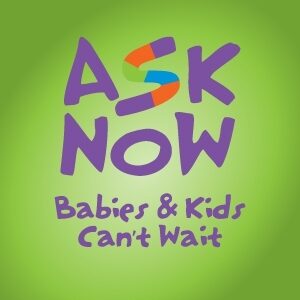
What happens when an infant or toddler gets off track developmentally?
During the first three to five of life children are growing rapidly – physically, intellectually and emotionally. Emerging research shows just how interrelated this development is to future success in school, and ultimately, in life. So what happens when an infant or toddler gets off track developmentally? Of concern, the Centers for Disease Control and Prevention estimates that 17 percent of children have a developmental or behavioral disability and one in 68 are have an autism spectrum disorder. Additionally, many children have delays in language or other developmental areas which can impact school readiness and in turn, success in life.
Developmental screenings identify children who have developmental concerns or problems that indicate a need for further evaluation or intervention. Screenings and assessments also give parents, families, and caregivers who work with children a better understanding of a child’s strengths and needs. The American Academy of Pediatrics recommends that all children receive developmental screenings at 9, 18, and 24-30 months in order to identify delays and provide intervention services as early as possible.
Spokane Regional Health District is completed a two-year pilot project focused on 1) increasing community awareness of the importance of children getting early screening for developmental delays, and 2) increasing the number of Spokane County children getting timely screenings. The project was developed after a 2013 community asset mapping project coordinated by the ITN (Infant Toddler Network) of Spokane Regional Health District (SRHD), local Pediatric Champion, Dr. Kristi Rice, the University of Washington GREAT MINDS, and the Department of Health gathered input of nearly 30 participants. In this process, 182 medical providers were surveyed including primary care providers, nurse practitioners, case managers and mental health professionals. At that time, only 55% of professionals surveyed utilized a standardized screening tool in their practice occasionally and 27% indicated they did not have adequate time to thoroughly screen children. Only two of the surveyed pediatric providers used a standardized screening tool routinely.
In 2014, the SRHD Universal Developmental Screening team worked with WithinReach to focus on the first goal of increasing community awareness by developing a Spokane-specific multi-media campaign. The Ask-Now, Babies and Kids Can’t Wait (www.srhd.org/Ask-Now.asp) campaign includes a brochure, web page, paid Facebook campaign, month-long run of internal STA bus placards, new parent postcards, and a public service announcement that ran for 5 weeks on a local network channel (http://www.youtube.com/watch?v=hxWPA0-pFh8).
Spokane Regional Health District, with the assistance of Dr. Kristi Rice, then coordinated a pilot project to support pediatricians in adding standardized screenings to their clinical practices based on the AAP guidelines. We have surpassed the goal of four providers and will have thirteen pediatric providers from Rockwood and CHAS trained and providing screenings by January 2016. Providence pediatricians have been trained and have implemented universal screenings prior to the SRHD pilot project. The training also includes a description of the referral process and local resources for intervention services at the Infant Toddler Network and school districts. Beginning in January, providers can be reimbursed for three standard screenings and additional specific screenings for Autism under the Bright Futures guidelines.
Please contact Heather Wallace, Health Program Specialist at Spokane Regional Health District if you have any questions about the pilot project or related data hwallace@srhd.org.
